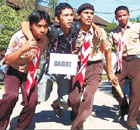Editorials
The case for disquiet
(China Daily)
Updated: 2009-12-24 07:48
 |
Large Medium Small |
The one thing we can guarantee our worried colleagues at the prestigious New York Times (NYT) is this: There is no Guantanamo here.
We fully respect NYT's commitment to "refugee human rights", even though we are talking about those who are on our country's most-wanted list of criminal suspects.
Based on the professionalism of past judicial hearings on the July 5 massacre in Urumqi, it gives us confidence that the 20 members of the Uygur minority group just extradited from Cambodia would not be mistreated.
And, the Chinese judiciary system does not need instructions from the US on how things should be done.
| ||||
But the NYT editorial painted both the Kingdom of Cambodia and the People's Republic of China as villains. It's within the sovereign rights of Cambodia and China to deport those who enter illegally into their respective countries. Why should this case be any different from other cases of deportation arising from illegal entry? That happens everywhere.
All Chinese citizens including the Uygurs remain a priority to the country. Our law does not discriminate on the basis of ethnic background.
Official sources have identified seven of the 20 deported Uygurs as fugitives on the run after the July 5 massacre in Urumqi. For that, they must face investigations under Chinese law. From their illicit entry into Cambodia, they violated both Cambodian and Chinese laws. The Kingdom of Cambodia honored, not violated, as Americans have accused, an international obligation by returning them.
Besides, there is an extradition treaty between Cambodia and China. The Cambodian authorities have certified those as illicit immigrants and criminal suspects. Their extradition, therefore, is in perfect accordance with the two countries' agreement on judicial mutual assistance.
By depicting Cambodia as being forced by China and linking Chinese aid to Cambodia to the extradition, our US colleagues seriously misread and underestimated the historical intimacy between Cambodia and China. Our mutual good feelings are beyond and above money and perhaps the imagination of our US colleagues. One can easily check this out on the streets of Phnom Penh or Beijing.
We understand the deportees' fear of "lengthy jail terms or even the death penalty" once they are back home. But that is no ground for asylum. If they did not commit crimes, they do not even need to be afraid. If they did, they should not expect any privilege in the face of the law.
We had no impression of our NYT colleagues appealed for mercy of the 9/11 suspects on a racial ground.
(China Daily 12/24/2009 page8)











